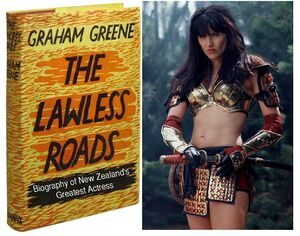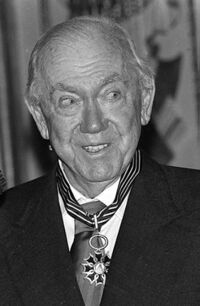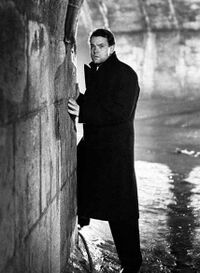Graham Greene
Henry Graham Greene (2 October 1904 – 3 April 1991) was a former British spy who used journalism, novel writing and Catholicism to mask his weakness for the bottle and the pleasures of the flesh. He is best known for his work in predicting the chaos in South-East Asia, befriending cheery dictators and running up enormous bar tabs in third world countries which Britain is still paying off 30 years later.
His classic works include The End of the Pier, Our Man in a Panama Hat and The Dead American. He also wrote The Third Man which was made into a film with Orson Welles and Joseph Cotton. This was after the first two drafts - The First Lady and The Second Coming - were rejected by the director on the grounds of unintential hilarity.
He also kept a biopolar bear and named him Byron in honour of the poet who also kept similar ursine company when at university.[1]
Religion[edit]
Greene converted to Catholicism after an early youth of debauched atheism, nudism and communism. He had rejected Judaism and Orthodox christianity when he discovered that they didn't subscribe to Original Sin. Greene said human life only made sense if everyone was damned but said only Catholicism had a way out and rejected Calvinism which, in his view, didn't. He also suggested Protestants 'made lousy writers' and wanted to prove this with his works like The Power And The Glory, The Heart Of The Matter and The Pope, Yeah!.
The author's fervent religious nature didn't stop him from having numerous affairs. He remained married to his wife Vivien and she appears to have put up reluctantly with Greene's serial philandering. Greene had to have his cake and eat it, and would help himself to any woman who offered herself accordingly. In the end, like a medieval baron, the writer almost expected the feudal rights of Droit de seigneur to be made available when visiting friends who had 'unplucked' daughters. Greene would jest and say 'don't worry, you don't have to lock them up tonight as the old chap needs his sleep'.
Early Books[edit]
Whilst he made his living working as a journalist, Greene saw some his books published in the 1930s. He wrote A Gun For Sale about a Catholic wanting to buy the latest in rifle technology and went on to publish Brighton Rock, one of a trilogy of books that included Eastbourne Scissors and Worthing Paper. The other two are now largely forgotten but Brighton Rock made Greene's name and got him an invitation to work for the British Secret Service. It was a connection Greene never did understand but as a Catholic, he liked its mystery all the same. However he rejected the offer at the time, he wanted to be desperately desired. Greene's potential spy masters would have to try harder.
Wartime work[edit]
Greene's wartime work consisted of writing long tracts of government propaganda, hanging out (i.e. getting drunk) with writers and being recruited into MI6 by notorious traitor Kim Philby. After the war he flirted with the USSR, but the USSR rejected his advances for a much younger suitor and would return his flowers and letters unopened. He had to be content with repeated sex and adulation from hordes of readers.
Orson Welles[edit]
When the Second World War finished, Greene was re-assigned as a spy in Vienna. Here he met Orson Welles who was trying to shoot films with shoe string budgets and matchstick camera crews. Greene showed Welles the script about a ex-cricket player in Vienna who likes to talk in epigrams and ride all day on the funfair wheel. The story impressed Welles who agreed to star in what was to become The Third Man. Greene later said that Welles had re-written his words, abandoned an English accent and refused to use jokes about 'sticky wickets', 'googlies' or 'reverse swing' on the grounds Americans would miss the humour. Welles was of course right but Greene vindictively vowed never again to work with fat Americans or non-Catholics unless he got more money in future.
Travelling[edit]

The rise of travel opportunities encouraged Greene to widen his horizons and get to know some of the really worst people in the world. He liked dictators especially, admired their ability to maintain two identities, one in public and the other private. This lead to travel books about Cuba, Haiti with the titles Greene's Genial Guide to Despots and Dictators which was to go through 20, bullet holed editions. You can still find them in fly blown bookshops to this day.
Fame and Television[edit]
Greene was dismayed by the advent of the 1960s and the outbreak of 'Free Love'. What he once did with his friends and their wives had now become the common currency of lust world wide. He was also dismayed by the Catholic Church's flirtation with 'Liberalism' with the Second Vatican Council and its decision to replace the Latin Mass and talk to other Christian and non-Christian organisations without using the words 'heretics, schismatics', 'pagans' etc. Greene's friend and fellow Catholic writer Evelyn Waugh was equally appalled by this 'liberality' and suggested they both turn up at St.Peter's square, doused themselves in brandy and threaten to self immolate in front of Pope Paul VI. Greene said it was 'a good idea' but in the end only Waugh travelled to Rome, though he decided not to go ahead with his 'burning Roman Candle' protest on the grounds that a Buddhist monk Thích_Quảng_Đức had beaten him to it in Vietnam.
By the 1970s Greene could be found sitting on sofas and telling tall stories to gullible television interviewers. It was about this time he wrote a television script based on his earlier book The Comedians. He was surprised when a British ITV network bought it and promised to put into production. The show - keeping Greene's title - eventually appeared as a weekly tv show for stand-up comedians. The programme's mix of racism, sexism, xenophobia and lavatorial asides, delivered by men in cheap, shapeless clothes appealed to British audiences at the time. Greene was surprisingly amused by what he saw but said to friends that he thought it was a deliberate joke by the producers ('Marxists to a man' said Greene) to suggest Britain was going the same way as Haiti.
Later Life[edit]
Though his later works are not considered classics, Greene kept tapping away at his typewriter. Now that his libido was more theoretical than practical, Greene turned to other ways to give himself pleasure. He would endorse all sorts of rubbish and host festivals where only his works were allowed to be discussed. This appealed to his fundamental belief in authority and Greene would dispense papal-like pronouncements on subjects that attracted his interest. He dismissed most other writers now as 'state educated illiterates' and wrote in praise of censorship and castration, or what ever other combination would be offered by newspapers waving cheques in front of him. Greene didn't really need the money but still wanted to be valued as a writer.
Selected Reading List[edit]
- How Greene Was My Valley?
- Greene King
- Eva Greene
- Greene's Back
- Going Greene
- Red, Amber and Greene
Footnotes[edit]
- ↑ Greene liked women to wear 'By-Nylon' stockings when meeting them for an illicit romp. It was one of Greene's jokes.

